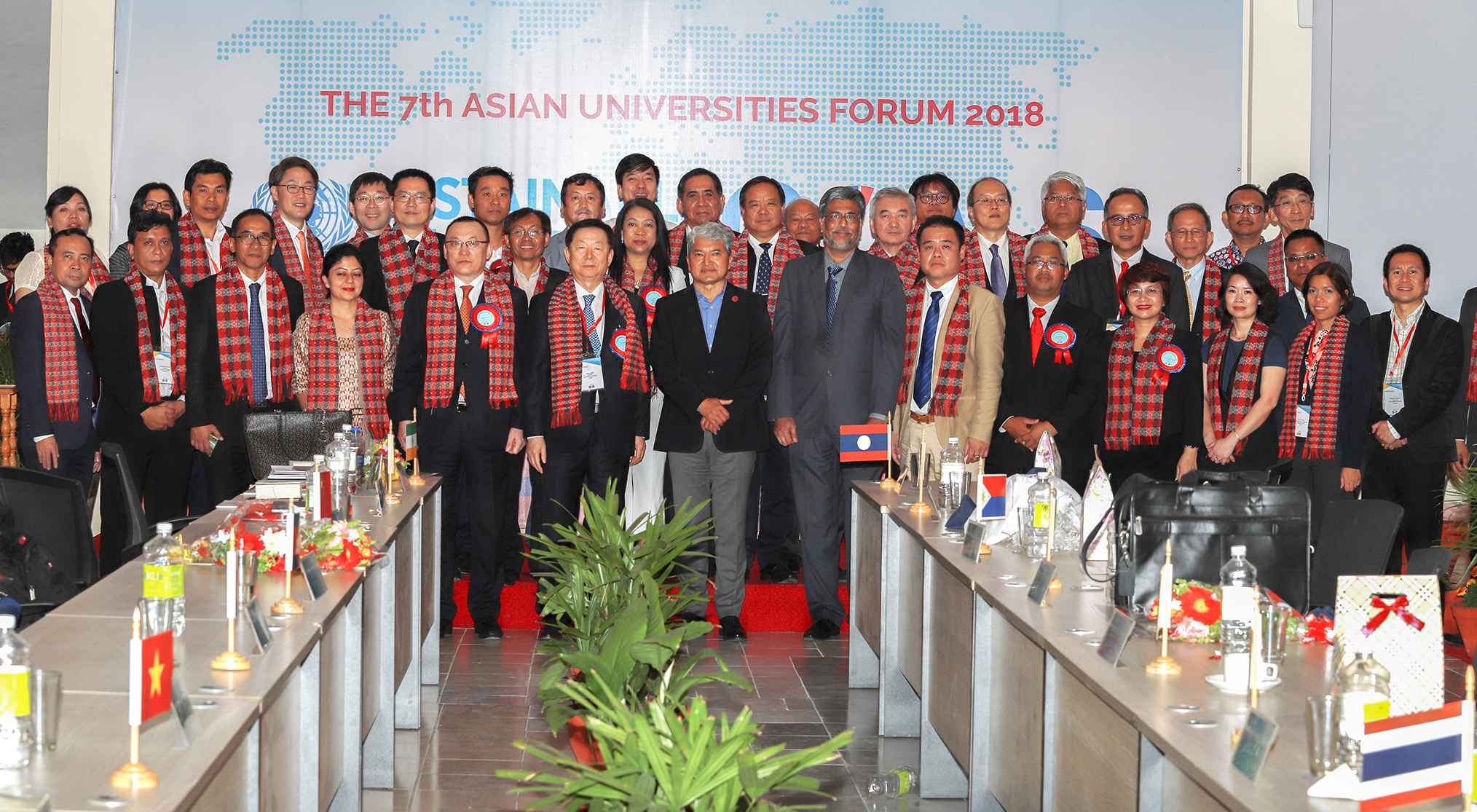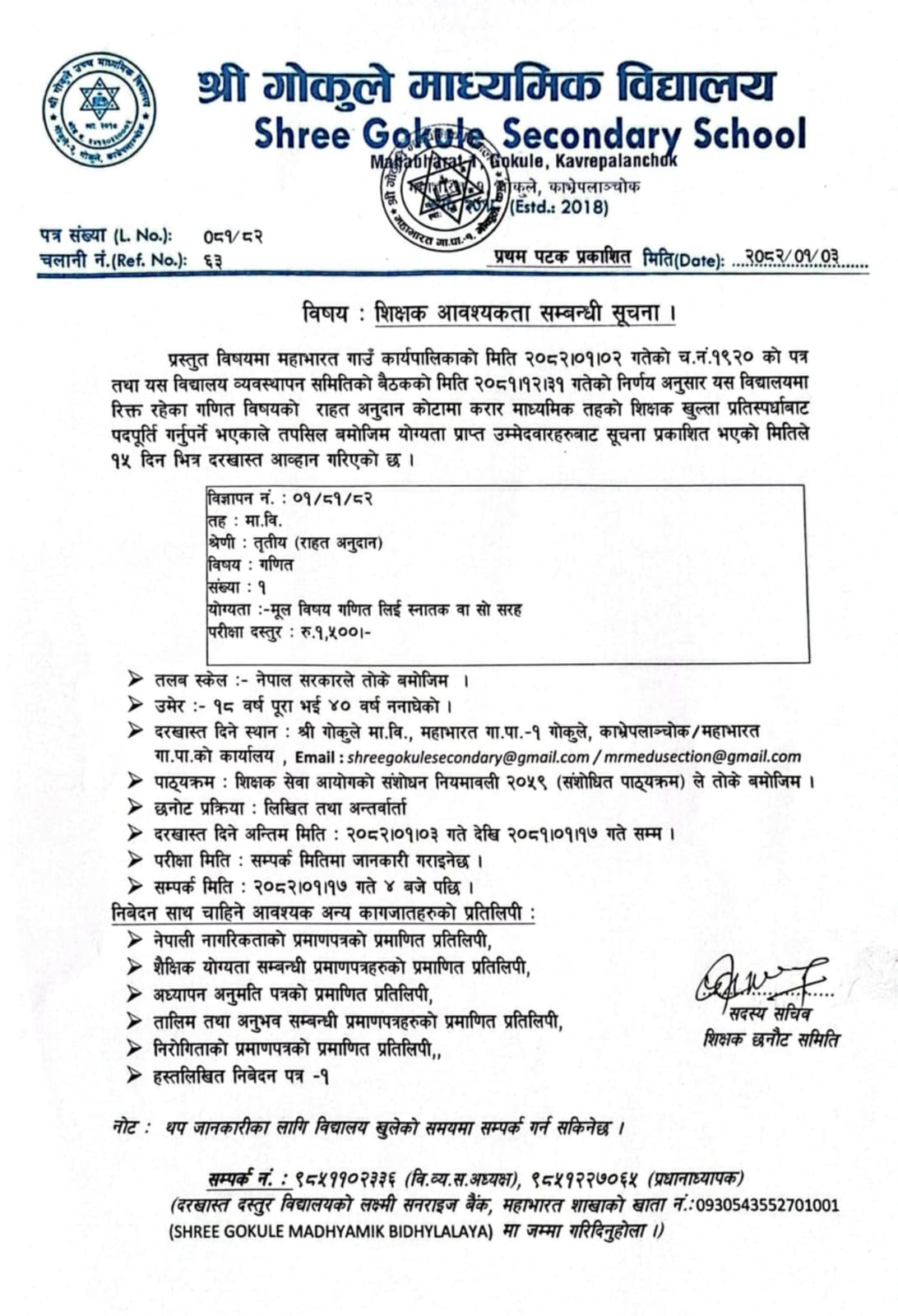 प्रभातफेरी अनलाइन ३८३ पटक पढिएको प्रकाशित मिति: २०८० पौष ७, शनिबार (१ साल अघि)
प्रभातफेरी अनलाइन ३८३ पटक पढिएको प्रकाशित मिति: २०८० पौष ७, शनिबार (१ साल अघि)
Redefining the University Culture
A university is more than a set of classes and labs, programs and degrees; it is an experience.
Nowhere is this truer than at Kathmandu University, where learning happens everywhere—over coffee at the cafeteria, in performances at the open-air theatre, and in discussions with friends and faculty beyond the classroom.
Education at Kathmandu University is not aimed at producing just another run-off-the-mill batch of graduates but at creating thinkers, innovators and leaders in the chosen fields. A student at Kathmandu University graduates not just with a degree and cutting-edge knowledge of the academic discipline but also with the essential humane qualities of critical inquiry and empathy.
Ultimately, Kathmandu University’s aim is to achieve academic excellence, innovation, entrepreneurship and leadership through holistic, quality education that produces leaders in the field and contributes to building a better world.
At the core of Kathmandu University’s academic excellence is its efforts towards internationalization and global engagement. From early on, the university established collaborations with global universities and academic institutions through Memoranda of Understanding for student and faculty exchange. Moreover, the university has prioritized the admission of international students, with the firm belief that they serve as informal global ambassadors of Nepal when they return home with their degrees.
In its three-decade history, over 5,225 international students from 55 countries have graduated from Kathmandu University. That is an impressive 13 percent international student percentage out of almost 43,123 total graduates of the university. What makes Kathmandu University a unique choice for international students are its affordable fees, English-medium teaching, easy visa norms, and diverse and hospitable Nepali society.
With over 200 programs across seven schools, Kathmandu University is one of Nepal’s top universities. Equipped with state-of-the-art facilities, an enabling environment for cutting-edge research, and globally renowned faculty, Kathmandu University is a pioneer in bringing knowledge and technology to the service of humankind. The university holds the distinction of producing over 50 percent of the doctors practising in Nepal today, and its programmes in Engineering, Science, Law, Management, Humanities and Education are for their significant interventions in the academia and the industry globally.
Investing in Research, Development and Innovation
The Research, Development and Innovation (RDI) Directorate at Kathmandu University helps facilitate, administer, monitor, and keep records of the research-based projects and degrees undertaken at the university. The RDI has a list of 136 externally funded running projects, of which 12 are funded by NTIC (KOICA) and are in the process of completion. The major funding partners and collaborators are Ministries, various government bodies, UGC, ICIMOD, Energize Nepal, the European Union, and various developmental agencies and institutions from friendly countries such as India, China, Norway, Sweden, the USA, the UK, Australia, Netherlands, and Germany etc.
The Major research areas are education, health, energy, environment, agriculture, water, hydropower, IT, culture and society, and capacity building. As many as 11 externally funded projects have been added in the year 2023 with approximate funding of NRs4, 15, 91,829.
In addition to externally funded projects, every year, KU also funds research projects through its own resources (internally funded projects) so as to engage more and more faculty members and students in the research activities. This year, the projects receiving funding are categorized into those receiving NRs100,000 and NRs200,000.
The RDI Office also keeps track of various research-based degrees, including PhDs. At present, there are 236 PhD scholars doing research for their degrees in the various schools of the university, and among them, more than 25% are women. In 2023 alone, 126 new scholars were admitted for their PhDs in seven schools.
Utilizing Technology for Nation-Building
The Nepal Technology Innovation Centre (NTIC), apart from being a research centre, embodies a commitment to national development, a promise to overcome challenges and a celebration of the limitless possibilities that emerge when minds unite for a common purpose. Established in collaboration with the Korea International Cooperation Agency, it highlights the transformative power of global collaboration in shaping the future of our nation and reflects the collaborative spirit that defines Kathmandu University.
NTIC is not merely a physical space; it is a nexus for research, innovation, and business development, impeccably blending cutting-edge architecture with advanced laboratories. It is a space where ideas will flourish, innovation seeds will be nurtured, and collaborations will spark breakthroughs that extend far beyond our borders.
In a nation grappling with job scarcity and navigating challenging business climates, NTIC is a testament to our dedication to creating a supportive environment for business development. At the core of NTIC’s mission is the aspiration to inspire originality and integrate technology into the fabric of our society. NTIC aims to offer short, certified courses and training opportunities, opening our doors to researchers, entrepreneurs, and technology enthusiasts from diverse backgrounds.
From Campus to Community: Highlights of the Work of KU Schools
School of Engineering (KUSOE)
KUSOE has established Nepal’s first hydrogen refueling station and procured a hydrogen car (Hyundai Nexo). In addition, the school has prepared tunnel design frameworks for weak rock mass; tested Shotcrete and Concrete samples from different hydropower projects; conducted a feasibility study and tunnel stability analysis for a one-kilometer-long road tunnel; and designed and constructed the Kathmandu University Research Tunnel (234m total length, 25m completed). The school has begun a Masters of Health Informatics programme, hosted Nepal’s largest physical hackathon under Major League Hacking (MLH); organized IT Meet and AI Meet; received grants for predictive maintenance of turbines and projects related to pumped storage hydropower plants; and started the fabrication of a model turbine and established an academic Hydraulic Machines laboratory.
School of Medical Sciences (KUSMS)
KUSMS is renowned for its commitment to excellence in medical education and research. Located at the forefront of advancing healthcare, it provides comprehensive training for aspiring healthcare professionals. The curriculum integrates cutting-edge medical knowledge with hands-on clinical experience, preparing students for the challenges of modern medicine. The school’s emphasis on research contributes to medical advancements, fostering a dynamic learning environment. It has already started PhD and masters by research programs in different fields. It is planning to start a fellowship in medical research and medical education soon. The school is working closely with the university administration in the establishment of a multi-specialty teaching hospital.
School of Arts (KUSOA)
KUSOA aims to promote professional knowledge, understanding and skills in the development of arts, culture, and other social and economic potentials of human resources through scholarly activities, critical thinking, analysis and communications practical interventions, assessments and evaluations, integration of social, economic, political, cultural and environmental components of development. The school has been running programmes in Economics, Craft & Design, Music, Yogic Sciences & Wellbeing, Media Studies, Urban Studies, Development Studies, Human & Natural Resources Studies, Landscape Management & Heritage Studies, and Community Development through its central and constituent colleges.
School of Education (KUSOED)
KOSOED, a pioneering institution in the teaching research of Education, encourages students to engage in activities that promote critical thinking, problem-solving, and collaboration. has strong partnerships with relevant agencies and communities to understand their needs. We also invite industry professionals as guest speakers, advisors, or even as adjunct faculty – which we call ‘professor of practice’. Moreover, our students engage in internships, co-op programs, and industry projects. It envisions producing better graduates, by offering community-driven and needs-based teacher education programs.
School of Science (SOS)
SOS began its journey in higher education with studies in Biotechnology, Environmental Science and Engineering, Mathematics, Pharmacy, Physics, and Life Sciences, and has remained a go-to destination for the study of Science in Nepal. A major research highlight of SOS is the establishment of the aeroponic system, a process which does not use soil, thus eliminating the risk of disease transmitted through soil. In comparison with traditional screenhouses, it is known to give ten times the production of traditional farming systems. Kathmandu University has provided 20 farmers with training in aeroponic technology as part of its goal of giving back to the community.




प्रभातफेरी अनलाईन
बनेपा नपा-५,राजदास मार्ग
९८५११२८४५०,९८४१४२८४५०
प्रा.फम द. नं.: ९६७९/०७६/०७७
सूचना विभाग दर्ता नं.: ८२०/०७४-७५
| संचालक : | प्रल्हाद शर्मा हुमागाईं सम्पर्क: ९८५११२८४५० |
| सम्पादक : | राज्यलक्ष्मी श्रेष्ठ सम्पर्क: ९८४१४२९९६५ |
 0
0